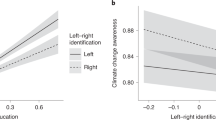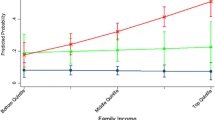Abstract
U.S. public opinion regarding climate change has become increasingly polarized in recent years, as partisan think tanks and others worked to recast an originally scientific topic into a political wedge issue. Nominally “scientific” arguments against taking anthropogenic climate change seriously have been publicized to reach informed but ideologically receptive audiences. Reflecting the success of such arguments, polls have noted that concern about climate change increased with education among Democrats, but decreased with education among Republicans. These observations lead to the hypothesis that there exist interaction (non-additive) effects between education or knowledge and political orientation, net of other background factors, in predicting public concern about climate change. Two regional telephone surveys, conducted in New Hampshire (n = 541) and Michigan (n = 1, 008) in 2008, included identical climate-change questions that provide opportunities to test this hypothesis. Multivariate analysis of both surveys finds significant interactions. These empirical results fit with theoretical interpretations and several other recent studies. They suggest that the classically identified social bases of concern about the environment in general, and climate in particular, have shifted in recent years. Narrowcast media, including the many Web sites devoted to discrediting climate-change concerns, provide ideal conduits for channeling contrarian arguments to an audience predisposed to believe and electronically spread them further. Active-response Web sites by climate scientists could prove critical to counterbalancing contrarian arguments.
Similar content being viewed by others
References
Chatterjee S, Hadi AS, Price B (2000) Regression analysis by example, 3rd edn. Wiley, New York
Davidson DJ, Freudenburg WR (1996) Gender and environmental risk concerns: a review and analysis of available research. Environ Behav 28:302–339
Dietz T, Fitzgerald A, Shwom R (2005) Environmental values. Annu Rev Environ Educ 30:335–374
Dietz T, Dan A, Shwom R (2007) Support for climate change policy: social psychological and social structural influences. Rural Sociol 72:185–214
Dunlap RE, McCright AM (2008) A widening gap: republican and democratic views on climate change. Environment September/October. http://www.environmentmagazine.org/Archives/Back%20Issues/September-October%202008/dunlap-full.html
Dunlap RE, Xiao C, McCright AM (2001) Politics and environment in America: partisan and ideological cleavages in public support for environmentalism. Env Polit 10(4):23–48
Finucane ML, Slovic P, Mertz CK, Flynn J, Satterfield TA (2000) Gender, race, and perceived risk: the ‘white male’ effect. Health, Risk Soc 2(2):159–172
Freudenburg WR (2000) Social constructions and social constrictions: toward analyzing the social construction of ‘the naturalized’as well as ‘the natural. In: Spaargaren G, Mol APJ, Buttel FH (eds) Environment and global modernity. Sage, London, pp 103–119
Hamilton LC (2008) Who cares about polar regions? Results from a survey of U.S. public opinion. Arct Antarct Alp Res 40(4):671–678
Hamilton LC (2009) Statistics with stata, version 10. Cengage, Belmont
Hamilton LC, Keim B (2009) Regional variation in perceptions about climate change. Int J Climatol. doi:10.1002/joc.1930
Hamilton LC, Hamilton LR, Duncan CM, Colocousis CR (2008) Place matters: challenges and opportunities in four rural Americas. Carsey Institute, University of New Hampshire, Durham
Hamilton LC, Colocousis CR, Duncan CM (2010) Place effects on environmental views. Rural Sociol 75(2):326–347
IPCC (2007a) Climate change 2007—the physical science basis. Contribution of Working Group I to the Fourth Assessment Report of the Intergovernmental Panel on Climate Change. Cambridge University Press, Cambridge
IPCC (2007b) Climate change 2007—impacts, adaptation and vulnerability. Contribution of Working Group II to the Fourth Assessment Report of the Intergovernmental Panel on Climate Change. Cambridge University Press, Cambridge
IPCC (2007c) Climate change 2007—mitigation of climate change. Contribution of Working Group III to the Fourth Assessment Report of the Intergovernmental Panel on Climate Change. Cambridge University Press, Cambridge
IPCC (2007d) Climate change 2007—synthesis report. Cambridge University Press, Cambridge
Iyengar S, Hahn KS (2007) Red media, blue media: evidence of ideological polarization in media use. Paper presented at the annual meeting of the International Communication Association, San Francisco, CA, 5/23/07
Jacques PJ, Dunlap RE, Freeman M (2008) The organisation of denial: conservative think tanks and environmental scepticism. Env Polit 17(3):349–385
Kahan DM, Braman D, Gastil J, Slovic P, Mertz CK (2005) Gender, race and risk perception: the influence of cultural status anxiety. New Haven, CT, Public Law & Legal Theory Research Paper No. 86
Krosnick JA, Holbrook AL, Lowe L, Visser PS (2006) The origins and consequences of democratic citizens’ policy agendas: a study of popular concern about global warming. Clim Change. doi:10.1007/s10584-006-9068-S
Lorenzoni I, Pidgeon NF (2006) Public views on climate change: European and USA perspectives. Clim Change 77(1–2):73–95
McCright AM, Dunlap RE (2000) Challenging global warming as a problem: an analysis of the conservative movement’s counter-claims. Soc Probl 50(3):348–373
McCright AM, Dunlap RE (2003) Defeating Kyoto: the conservative movement’s impact on the U.S. climate change policy. http://stephenschneider.stanford.edu/Publications/PDF_Papers/McCrightDunlap2003.pdf. Accessed 25 June 2008
Newport F (2008) Little increase in Americans’ global warming worries. Gallup, http://www.gallup.com/poll/106660/Little-Increase-Americans-Global-Warming-Worries.aspx. Accessed 26 June 2008
Nisbet MC, Myers T (2007) Twenty years of public opinion about global warming. Public Opin Q 71(3):444–470
Olofsson A, Öhman S (2006) General beliefs and environmental concern: transatlantic comparisons. Environ Behav 38:768–790
Pew (2004) News audiences increasingly politicized: online news audience larger, more diverse. Pew Research Center, June 8. http://people-press.org/report/215/news-audiences-increasingly-politicized. Accessed 20 August 20
Pew (2006) Little consensus on global warming: partisanship drives opinion. Pew Research Center, July 12. http://people-press.org/reports/display.php3?ReportID=280. Accessed 17 November 2007
Pew (2007) Global warming: a divide on causes and solutions. Pew Research Center, January 24. http://people-press.org/reports/pdf/303.pdf. Accessed on 14 December 2007
Shwom R, Dan A, Dietz T (2008) The effects of information and state of residence on climate change policy preferences. Clim Change 90:343–358
StataCorp (2007) Stata survey data reference manual. Stata Press, College Station
UCS (2007) Smoke, mirrors and hot air: how ExxonMobil uses big tobacco’s tactics to manufacture uncertainty about climate science. Union of Concerned Scientists, Cambridge
USEP (2009) United States election project. http://elections.gmu.edu/voter_turnout.htm. Accessed on 28 August 2009
Wood BD, Vedlitz A (2007) Issue definition, information processing, and the politics of global warming. Am J Polit Sci 51(3):552–568
Author information
Authors and Affiliations
Corresponding author
Rights and permissions
About this article
Cite this article
Hamilton, L.C. Education, politics and opinions about climate change evidence for interaction effects. Climatic Change 104, 231–242 (2011). https://doi.org/10.1007/s10584-010-9957-8
Received:
Accepted:
Published:
Issue Date:
DOI: https://doi.org/10.1007/s10584-010-9957-8




